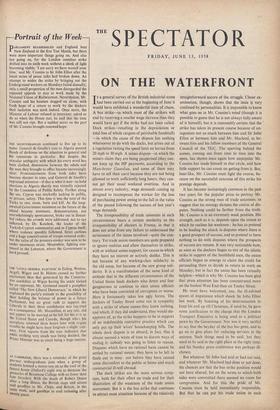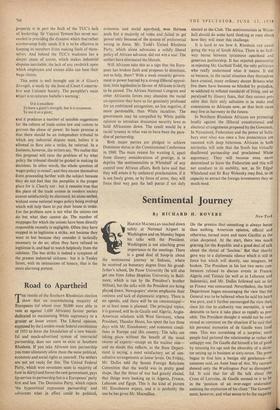ON THE WATERFRONT
I F a general survey of the British industrial scene had been carried out at the beginning of June it would have exhibited a wonderful state of chaos. A bus strike—in which most of the strikers will end by receiving a smaller wage increase than they would have got if the strike had not been called. Dock strikes—resulting in the depreciation or total loss of whole cargoes of perishable foodstuffs —in which the cause of the dispute has nothing whatsoever to do with the docks, but arises out of a regulation raising the speed limit on lorries from 20 mph to 30 mph. A mines dispute—in which the miners claim they are being pauperised (they can- not keep up the HP payments, according to the Manchester Guardian, and some of them may have to sell their cars) because they are not being allowed to work sufficiently long hours; they can- not get their usual weekend overtime. And in almost every industry, wage demands coming up designed to recompense the worker for the loss of purchasing power owing to the fall in the value of the pound following the success of last year's wage demands.
The irresponsibility of trade unionists in such circumstances bears a certain similarity to the irresponsibility of electors in France, in that it does not arise from any failure to understand the seriousness of the issues involved—quite the con- trary. Yet trade union members are quite prepared to ignore realities and allow themselves to strike, with or without union support, for causes in which they have no interest or actively dislike. This is not because of any working-class solidarity in the old sense, but because of the new group soli- darity. It is a manifestation of the same kind of attitude that in the different circumstances of the United States leads dockers who detest and fear gangsterism to continue to elect union officials who have been convicted of corruption or worse. Here it fortunately takes less ugly forms. The dockers of Tooley Street come out in sympathy with a strike of whose causes they know nothing, and which, if they did understand, they would dis- approve of, as the strike happens to be in support of an indefensible restrictive practice which can only put up their wives' housekeeping bills. The whole dock dispute is so absurd, in fact, that it almost seemed a waste of time to discuss ways of ending it; nobody was going to listen to reason. Disputes which have no rational basis cannot be settled by rational means; they have to be left to fizzle out in time : not before they have caused some discomfort to the public at home and much commercial abroad.
The dock strikes are the more serious symp- tom, both for their effect on trade and for their illustration of the weakness of the trade union movement. But it is the bus strike that continues to attract most attention because of the relatively straightforward nature of the struggle. Closer ex- amination, though, shows that the issue is very confused by personalities. It is impossible to know what goes on in Mr. Cousins's mind (though it is possible to guess that he is not always fully aware of it himself), but it is reasonably certain that the strike has taken its present course because of an- tagonism not so much between him and Sir John Elliot or between him and Mr. Macleod, as be- tween him and his fellow members of the General Council of the TUC. The sparring behind the scenes, coming out from time to time into the open, has shown once again how unpopular Mr. Cousins has made himself in that circle, and how little support he can count on getting from it. But, bear-like, Mr. Cousins must fight the course, be- cause on the successful outcome of this strike his prestige depends.
It has become increasingly common in the past two years for the popular press to portray Mr. Cousins as the strong man of trade unionism; to suggest that his strategy dictates the course of dis- putes. Nothing could be farther from the truth. Mr. Cousins is in an extremely weak position. His strength, such as it is, depends upon the extent to which he realises his weakness : he has to pretend to be leading the attack in disputes where there is a good prospect of success, and to pretend to have nothing to do with disputes where the prospects of success are remote. It was very noticeable how, as soon as the dockers began to tire of the idiotic strike in support of the Smithfield men, the union officials began to emerge to claim the credit for persuading them to decide to return to work on Monday; but in fact the union has been virtually helpless—which is why Mr. Cousins has been glad that press attention has been concentrated more on the busless West End than on Tooley Street.
He must have welcomed, too, the ill-advised spasm of impatience which shook Sir John Elliot last week. By boasting of his determination to keep his end up till Christmas, if need be, he gave some justification to the charge that the London Transport Executive is being used as a political pawn by the Government. Nor was it very tactful to say that the heyday of the bus has gone, and to go on to give plans for reducing services in the autumn. Such things need to be said; but they need to be said in the right place at the right time; and his Sunday press conference was perhaps ill- chosen.
But whatever Sir John had said or had not said, and whatever Mr. Macleod had done or not done, the chances are that the bus strike position would not have altered; for on the terms to which both sides were committed there seemed no room for compromise. And for this the pride of Mr. Cousins must be held immediately responsible. But that he can put his trade union in such jeopardy is in part the fault of the TUC's lack of leadership. Sir Vincent Tewson has never suc- ceeded in providing the dynamic which that rather cumbersome body needs if it is to be effective in keeping its members from making fools of them- selves. And behind the TUC's weakness lies a deeper cause of unrest, which makes industrial disputes inevitable; the lack of any yardstick upon which employers and unions alike can base their Wage claims.
This point is well brought out in A Giant's Strength, a study by the Inns of Court Conserva- tive and Unionist Society. The pamphlet's main object is to reiterate Isabella's warning : 0 it is excellent To have a giant's strength; but it is tyrannous To use it as a giant; and it produces a number of sensible suggestions for the reform of trade union law and custom to prevent the abuse of power. Its basic promise is that there should be an independent tribunal to which any industrial dispute must, before it is allowed to flare into a strike, be referred. In a footnote, however, the writers say, 'We realise that this proposal will raise the problem of by what policy the tribunal should be guided in making its decisions. In other words, the whole question of wages policy is raised'; and they excuse themselves from proceeding farther with the subject because they do not feel that the pamphlet is the proper place for it. Clearly not : but it remains true that the place of the trade unions in modern society cannot satisfactorily be discussed, let alone settled, without some national wages policy being evolvgd which will help them to put their house in order. For the problem now is not what the unions can do but what they cannot do. The number of stoppages for which the unions have been directly responsible recently is negligible. Often they have stepped in to legitimise a strike, not because they want to but because they consider it tactically necessary to do so; often they have refused to legitimise it, and had to watch helplessly from the sidelines. The bus strike is indeed a symptom of the present industrial sickness : but it is Tooley Street, with its intimations of lunacy, that is the more alarming portent.



































 Previous page
Previous page